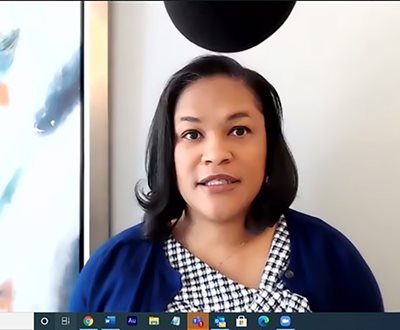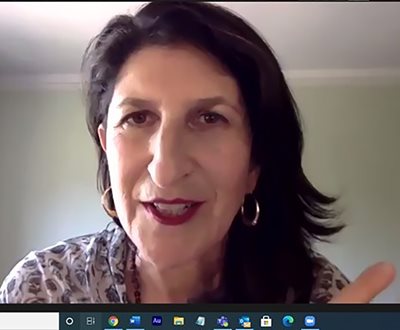Inaugural Spring Wellness Fair Tackles Grief and Stress
May 10, 2021
The D.C. Bar’s Communities and Lawyer Assistance Program marked Well-Being Week in Law (May 3–7) and Mental Health Awareness Month by hosting their first Spring Wellness Fair on May 6. The virtual event featured several nationally renowned life coaches and former attorneys who talked about the mental, emotional, and physical challenges many legal professionals encounter.
In his keynote address, Patrick Krill of Krill Strategies, LLC discussed gender disparity in the legal profession, with women experiencing more mental health issues and engaging in more risky alcohol use than men. Krill is the lead author of the soon-be-released groundbreaking study “Stress, Drink, Leave,” a joint research project of the California Lawyers Association and the D.C. Bar.
“It might be surprising to you that females are drinking more than men. There are a lot of reasons why that might be,” Krill said, noting that it is an anomaly. “In other professions men generally drink more than women, but not in the legal profession. Part of that has to do with cultural attitudes and norms and the pervasiveness of alcohol use [in the legal profession]. Sometimes, female attorneys feel like they have to keep up. But regardless, women are in a materially worse place when it comes to their drinking, which is really important to recognize.”
The wellness fair also addressed grief and loss during the pandemic, whether it’s of a loved one, a job, or in-person quality time with family and friends. Heather Horton, founder of H-Squared Group LLC, touched upon the effects of multiple losses in the breakout session “Grief Unplugged.”
 Horton recalled her journey from practicing tax attorney to grief and well-being coach for lawyers. During her first year in law practice in 2005, she survived a car accident in which she lost her mother and an aunt. Two weeks later, Hurricane Katrina devastated New Orleans, where she had lived for 33 years. While recovering from her physical injury on the West Coast and feeling separated from her community, Horton threw herself into work, even rising in the profession, without truly processing her multiple layers of grief.
Horton recalled her journey from practicing tax attorney to grief and well-being coach for lawyers. During her first year in law practice in 2005, she survived a car accident in which she lost her mother and an aunt. Two weeks later, Hurricane Katrina devastated New Orleans, where she had lived for 33 years. While recovering from her physical injury on the West Coast and feeling separated from her community, Horton threw herself into work, even rising in the profession, without truly processing her multiple layers of grief.
Grief intersects with diversity, equity, and inclusion, which are about uniqueness, belonging, and being vulnerable, Horton said. “If you can’t bring who you are to work, including your pain, it’s going to lead to productivity issues, lack of confidence, not serving your clients well; it’s going to lead to the bottom line of the [law] firm or organization in disarray,” she said. “So, we’ve got to start seeing ourselves as humans before we see ourselves as lawyers. That is what’s missing from the legal profession.”
Most people equate grief with death, but Horton said it is also the normal and natural reaction to any loss or change, such as loss of faith; control of one’s life; hopes, dreams, and expectations; safety; and trust. Even marriage can be a source of grief, Horton said, because a person’s life is changing once they’ve entered that union. “Change or gain produces grief,” she said.
To better process and move through grief in healthy ways, Horton recommended taking a step back to recognize the various forms of grief that we are experiencing. She also suggested that people examine the root causes of pain, stop suppressing feelings, learn personal triggers and leverage them for growth, and embrace the gift of now.
“If you’re not in the present, you’re either in the past, which is where depression lives, or you’re in the future, which is where anxiety lives,” said Horton. “You have to embrace the gift of the moment that’s in front of you.” She emphasized that one cannot separate the personal from the professional, and that it is okay to seek professional help and support.
Bonnie Prober, a former litigator-turned-social worker, presented “A Personal Path to Wellness,” in which she reported that 28 percent of lawyers suffer from depression, 19 percent experience anxiety, and 23 percent deal with stress. She also reported that nearly 12 percent of lawyers have had suicidal thoughts at some point in their careers.
In response to certain stressors related to the profession, such as long hours, demanding deadlines, hierarchical work structures, and stiff competition, Prober recommended various coping strategies. She mentioned the importance of being one’s own advocate, which involves taking advantage of options such as vacations, lunch breaks, and telecommuting; asking for help on big tasks; communicating one’s needs; and embracing the power of “no.”
“Stress is not what happens to us,” Prober said. “There are stressors we experience every day that are thrown at us from every direction. They are not inherently stressful. Stress is the response to what happens, and response is something that we can choose,” she said.
 In another breakout session, “Aligning Your Career Goals With Your Values,” Elena Deutsch, founder and CEO of WILL: Women Interested in Leaving (big) Law, invited attendees to participate in an interactive exercise that involved writing down behaviors that disturbed them in one column and the opposite of those behaviors in another column. Then Deutsch instructed participants to write down things that are important in their lives and what they want more of, such as quality time for meaningful personal connections, rest, and pursuit of other interests.
In another breakout session, “Aligning Your Career Goals With Your Values,” Elena Deutsch, founder and CEO of WILL: Women Interested in Leaving (big) Law, invited attendees to participate in an interactive exercise that involved writing down behaviors that disturbed them in one column and the opposite of those behaviors in another column. Then Deutsch instructed participants to write down things that are important in their lives and what they want more of, such as quality time for meaningful personal connections, rest, and pursuit of other interests.
In her practice, Deutsch said that she has encountered so many lawyers who are working in environments that do not align with their personal values. “There’s a tremendous amount of black or white, either/or thinking in lawyers,” she said. “[Lawyers] are trained to win or lose. You’re either hitting your billable hours or you’re not. Part of pushing out with this exercise is [identifying] more [life] possibilities.”
Deutsch said that doing the personal assessment exercise regularly is valuable. “Some of the magic of doing these exercises is that when you give your brain a filter, that particular activating system [subconscious brain] starts working for you,” she explained. “This is going to help you find people and opportunities. And synchronicities are going to start happening that align [with] your values.”
The Spring Wellness Fair programming is now available on demand. Content is free through May 28.





